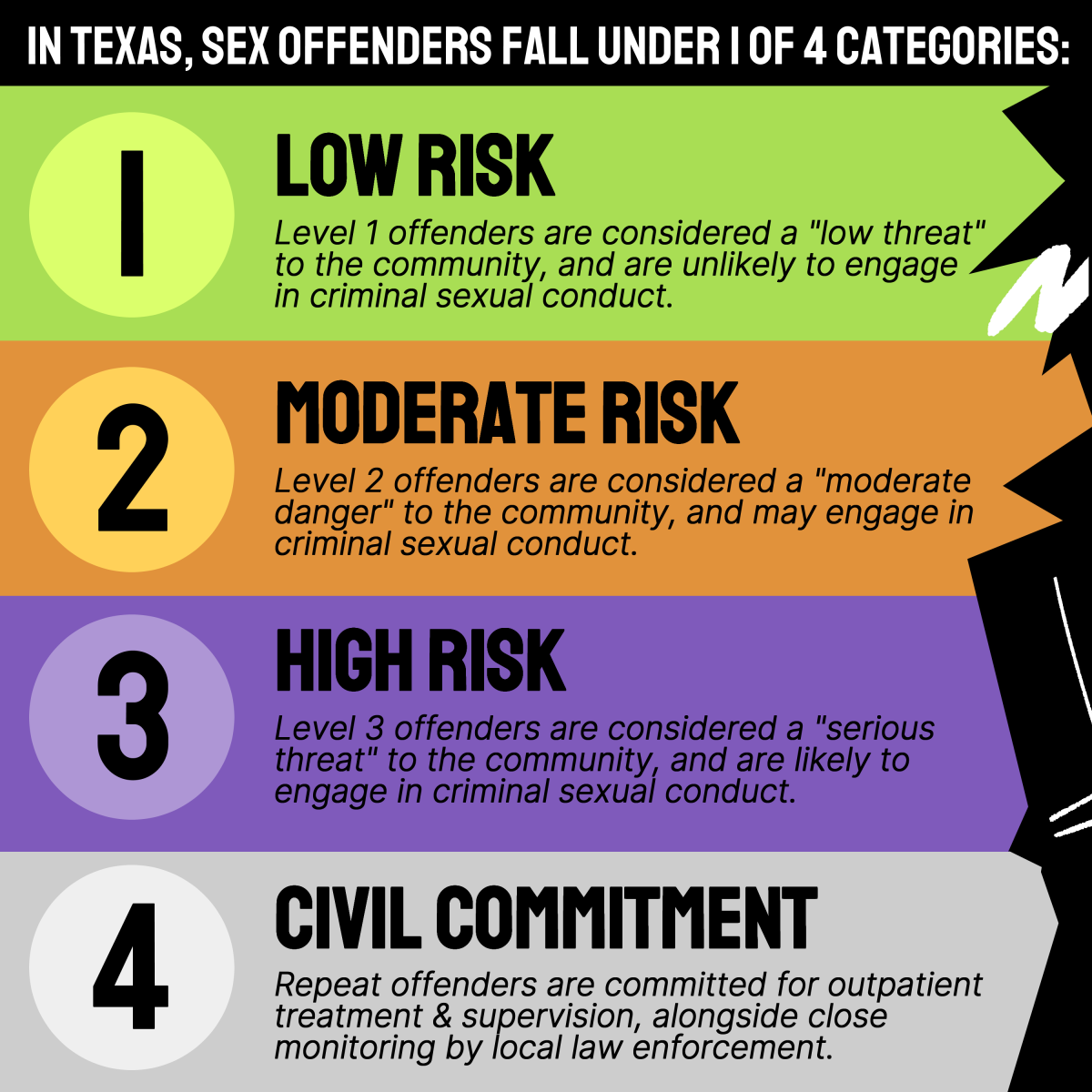The UTD student body currently includes seven registered sex offenders. The Mercury decided to take a deep dive into their presence at UTD, what this means for student safety, campus affairs and criminal background’s impact on education as a whole.
Texas is the state with the highest number of registered sex offenders at a total of 100,989, an average rate of about 336 offenders per 100,000, less than neighboring Arkansas but greater than most Southern states. The Texas Sex Offender Registration Program handles what is close to 1/8 of all registered sex offenders in the US as a whole. To protect students and help those attempting to reintegrate in society, UTDPD coordinates with surrounding city and county governments to ensure registered sex offenders on campus adhere to their court mandated restrictions and maintain a constant line of communication. According to Adam Perry, lieutenant of the UTDPD, there have been no reoffenses from those on UTD’s registry for as long as it has been active.
“I have been here a little over 7 and a half years, and I have never had to file on anyone before,” Sergeant Rod Bishop of the UTDPD said. “If we did file that would be the first in the past 7 years.”
The Texas penal code divides sex offenders into 3 broad categories; risk levels are determined by the Texas judicial system based on an individual’s case, offense, mental health and more. According to the Law Office of Matthew D. Sharp, low risk offenders are unlikely to engage in another criminal sexual act; qualifying charges include indecent exposure — nudity in public — and consensual sex with a prostitute. Moderate risk offenders have committed multiple criminal sexual acts — including sexual assault or sex with a minor — and may offend again. High risk offenders are extremely likely to offend again, qualifying charges including violent sexual assault or human trafficking. The offenders registered at UTD are considered either low or moderate risk. UTDPD updates those on the registry with what areas they must avoid, currently only the Callier Center, which has a playground for children. UTDPD also keeps track of updates and changes, such as a new phone, new contact information, new car or a name change.
“If they have a right to be here on campus and they are registered, then we don’t want to exclude them from being here,” Perry said. “But we also want to educate them on where they aren’t supposed to be, because if they violate their restrictions, they risk going back to prison. And so, ours is more to help them navigate while they are here on campus, not to exclude them, because it is their right to be here.”
A study funded by the New York Bar association found that 72% of colleges factor criminal background checks into their application process. UTD belongs to the minority that does not. Under UTD policy, applicants are not required to submit background checks unless specifically requested by the school president. Ryan Slack, senior director of the Office of Undergraduate Admissions, said that certain programs and roles will run background checks, but UTD as a whole focuses on academic qualifications, including past achievement, employment and volunteering. Perry said that areas where children predominantly congregate receive greater protection under state law and tend to require background checks. If admitted, registered sex offenders must notify UTDPD prior to the start of the semester as per state law. If an enrolled student becomes a registered sex offender during their time at UTD, they must notify campus within 7 days of their registration.
“We want to make sure that we are reviewing students on their individual academic merit and their ability to succeed here at the university,” Slack said.
Thomas Gray, political science professor and civil liberties expert, said that in the U.S. the limits of an individual’s civil liberties typically stop at the point where they affect public order or national security. More importantly, using “sex offense” as one broad term for different crimes oversimplifies the issue. Gray said that the culture surrounding offenders reduces the nuances of the legal system — including complicated court cases and possibly unrepresentative plea deals – into black and white. Gray also pointed out that the justice system does not have a central public registry for murderers or drunk drivers, despite the fact they also pose threats to public safety. There is a large difference between the lowest and highest risk levels of sex offenders, even though they all qualify for the registry and carry a similar stigma.
“The criminal register is a fairly controversial approach because it stigmatizes the person — some would say very fairly — because it provides information, accurate information,” Gray said. “But others would say that this is a huge barrier to them reintegrating with society. This is a huge barrier for them moving on with their lives and doing better with their lives, that this is holding them back. That personal growth that they need to do is limited.”





